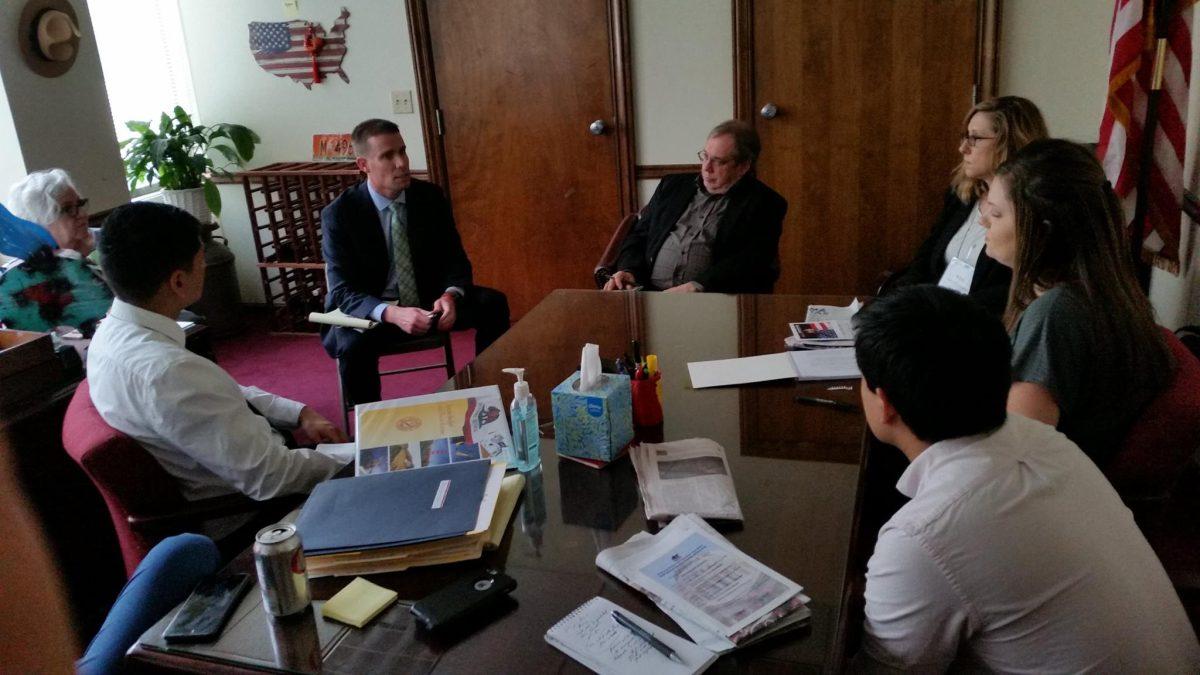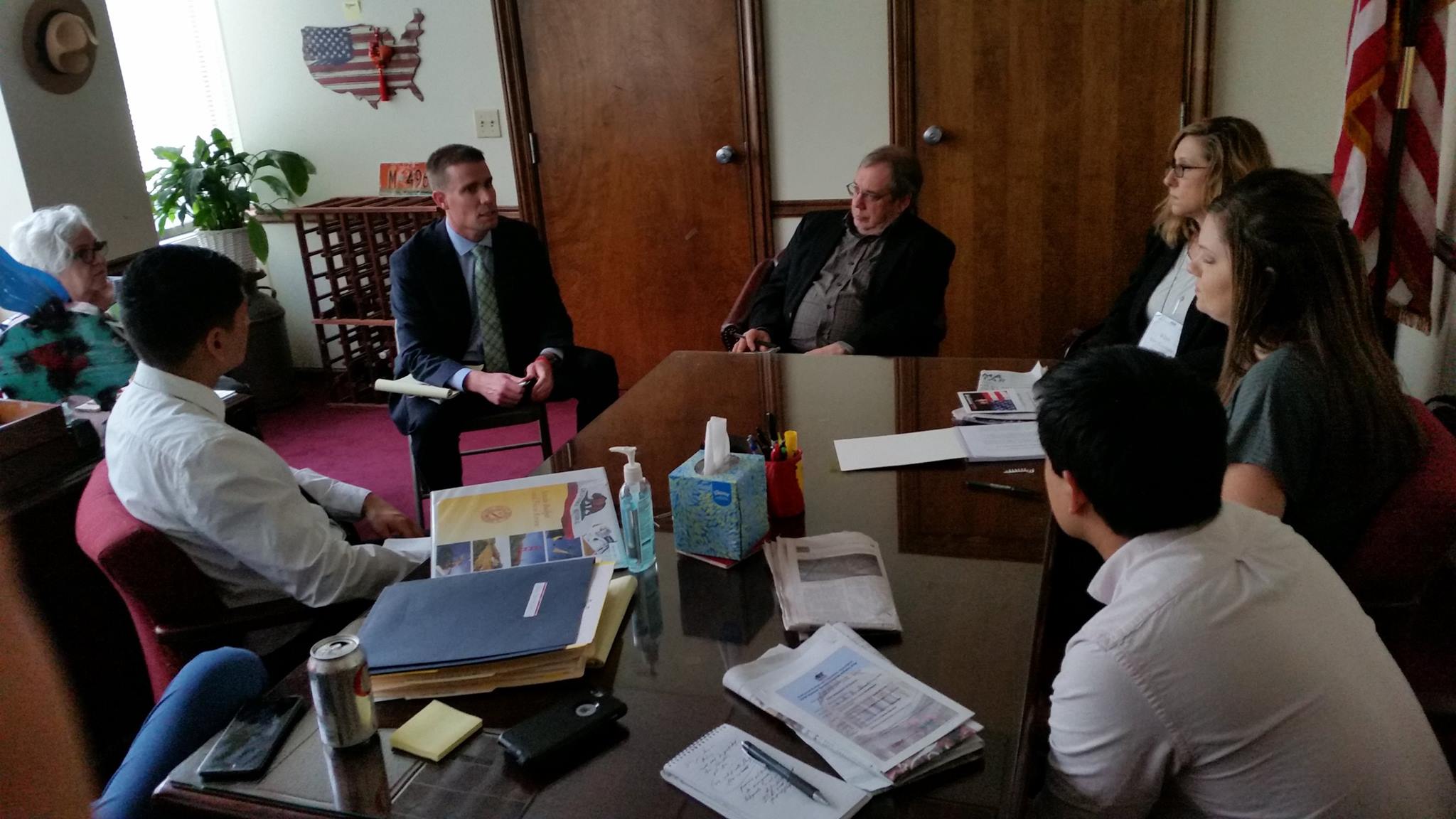Members of the STAR staff went to Sacramento on Wednesday to speak with state Sen. Mike McGuire, D-Healdsburg, a Sonoma State University graduate, about a number of issues such as immigration, tuition hikes and his time at Sonoma State. What follows is an edited transcript of that discussion.
STAR: “As you know, Sonoma County Sheriff Steve Freitas met with U.S. Attorney General Jeff Sessions before his confirmation, which was troubling to some people in the county. His concern is that Senate Bill 54 doesn’t make clear that counties are required to work with Immigrations and Customs Enforcement when somebody has committed a serious crime or felony. What are your thoughts on that?”
McGuire: “There is active negotiations happening right now with state sheriffs and the California police chiefs concerning the language of the bill, and there are a couple of items that need to be worked out. Number one is on the issue of felons. President Donald Trump has said that there are 2-3 million undocumented residents in this country that have some sort of criminal record, and that is absolutely false.
In the U.S, right now, there are about 800,000 undocumented residents who have some sort of criminal record and, narrowing that down, about 300,000 have a felony. Now what I think we are going to see is that for those individuals with a felony, they would not be protected. What police chiefs have asked for is to be more specific about where ICE can participate. I’m not sure where it’s going to end up, but I know we’re going to see changes.”
STAR: “The CSU has a proposed a $270 tuition increase that the Board of Trustees is going to be voting on in March. What are your thoughts on that?”
McGuire: “One challenge the CSU has is that we needed to give the faculty a raise last year, which needed to be done. But the governor has moved towards campuses having to take a portion of what this year’s allocation is in order to be able to give that raise . . . I believe that we will get most of this worked out in the budget, but we will have to see what our numbers are looking like. In January we finished about $300 to $350 million above where estimates were, so if we can knock out the state’s $1.6 billion deficit, which I think we can do, I think one of the top priorities will be (reducing) tuition increases.”
STAR: “How much of an impact do you think the #FreetheCSU movement will have on the Board of Trustees decision?
McGuire: “I think the more you can mobilize the better. Mobilizing with the Trustees, and mobilizing here in the Capitol, are going to be really important. Showing up at budget hearings is also going to be really important, to be able to come speak your piece.
We will be happy to work with you to start figuring out when those dates are. There will be one hearing simply focused on higher education, and everybody’s butts should be in those seats – packing those budget hearings in the both the Assembly and the Senate. I would even recommend showing up wearing a one-colored shirt and looking super organized.”
STAR: “A lot of students are working more or at least half time, and some even full time, so every time the tuition goes up some students really take a hit.”
McGuire: “It’s already really expensive; not even just school but figuring out rent and food every month. With that said, I am serious about students showing up to budget hearings because they are going to be really important. I know it can be a pain, but showing up is more than half the battle.”
STAR: “You’re a graduate of Sonoma State, what did you learn on campus?”
McGuire: “To be honest, it was some of the best two years of my life. I have never been more challenged, besides trying to pass statistics to get into Sonoma State. I really struggled in high school, and my grandma suggested that I get a tutor. I remember being at Gateway’s Learning Center and being around a lot of junior high school kids. I felt like such a rube, but it worked.”
STAR: “Can you tell us a little about your life before and after coming to Sonoma State?”
McGuire: “My mom and I struggled, so I went partially on a Pell Grant to Sonoma State. Afterwards I worked at TV-50 for seven years. I worked in the newsroom and was the morning news producer, and then I became assignment editor and also marketing director. Then our production director left, and I also took over that and I ended up being there for seven years.
During that time, I was also on the City Council in Healdsburg, and then I ran for the Board of Supervisors in Sonoma County, served on that for four years, and then I got elected to the state Senate. But my mom and dad had a really bad divorce when I was young and my grandma took us in on her farm and she has been an amazing driving force. I feel grateful to be here. It’s a privilege. I get emotional thinking about it.”
STAR: “Were you elected to the Healdsburg school board while you were at Sonoma State?”
McGuire: “I was an elected official at night and working during the day to pay the bills. My grandma had a stroke around that time, so she sold her farm and moved to Cloverdale with my mom. I was working full time and going to school full time, but I feel super grateful.
We are going to have some challenging times coming up, but I think we are going to come through it. The way the federal government is moving, we are going to have some dark times. However I am a super optimist and some of our nation’s best policies comes out of our nation’s toughest times.”
STAR: “The Legislative Analyst Office has recommended that California should converge the medicinal marijuana rules, that you helped write, with those approved with Proposition 64 that legalized the recreational use of cannabis. What are your thoughts on how that is going work?”
McGuire: I did not support Prop. 64 because of some of the problems we are facing now, which is an onslaught of rules and regulations that we are not going to be ready for.
We have between 20,000 and 25,000 growers between Sonoma County and the Oregon border, and the intention is to have every one of those farmers in our tax system by Jan. 1. That will be an uphill battle.
We have to buy technology in order for people to pay their taxes, which will track every pound of marijuana from the time it leaves the farm, to the time it goes to warehouse and from the time it goes to the dispensary for sale.
Massachusetts is on their second six-month delay in their recreational cannabis law, and California is a much larger state. It’s all about being transparent and honest so let’s tell businesses what we are going to do, so they can prepare for it, and let’s give hard dates in which we are going to be able to hit.”
STAR: “Do you have any thoughts on Measure A, a tax on commercial marijuana operations in unincorporated areas in Sonoma County that will be on the March 7 ballot? Some growers and others involved in cannabis operations are opposing it because, they say, the taxes and regulations proposed by the county are too harsh.”
McGuire: “I am in support of the measure. This industry has not paid a fraction of the tax that it should have, and I think that cannabis needs to become like every other regulated product that we have, such as gasoline or alcohol. There are consequences to industry. There is a lot of environmental cleanup that needs to be done. We have to restore our watersheds, and just to be able to enforce our rules regulations is going to be really expensive.”




































